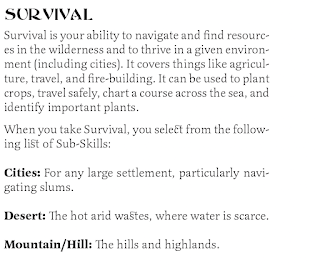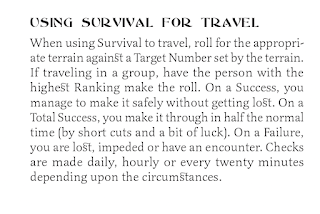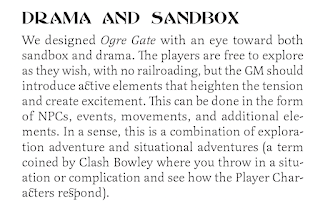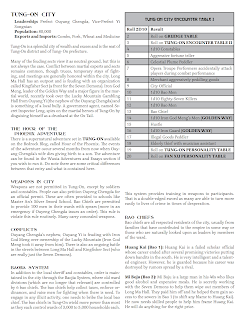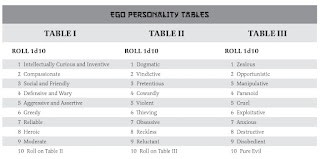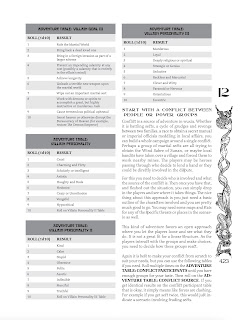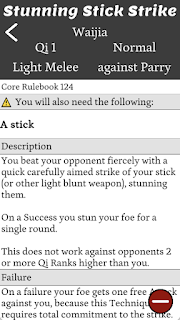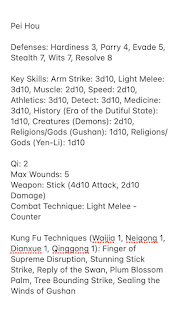I am running a short campaign for Wandering Heroes of Ogre Gate where all the characters are members of the the Celestial Plume Masters, with one player being a Master in the group, and the others Disciples. The basic premise is they've been given freedom to head beyond the region controlled by Celestial Plume Masters, and expand the group's power and influence (and the celestial plume market) how they see fit.
For this campaign I am not doing any prep, but using only material from the Sons of Lady 87 book (occasionally drawing on the other Ogre Gate Books when relevant) and using the Bedrock App anytime I need to improvise an NPC. I also plan to use what I call the random book approach. With this I just have a few key history books next to me and when I need an important detail, plot event, location, etc., I pick up the book that looks most appropriate then randomly open a page and find the first thing that is relevant and useable. As the campaign goes on, I may make some more tables to better facilitate the no-prep style.

Before the campaign we established personal ties for the player characters. Each player was able to roll on the martial world personality tables to find a sect or person they were connected to in a way that is personally beneficial to them, but they also had to roll for someone with whom they had a more dramatic and tense relationship (and if at any point during the campaign they resolve that relationship, they gain a free level). The characters all started out with a grudge as well. These are listed in their entries below.
I am using footnotes for information that isn't meant for the players my campaign.
PLAYER CHARACTERS
Wei Ziying: A skilled poisoner and physician, with ties to the Relentless Corpse Sect, Wei Ziying is a disciple of the Celestial Plume Masters. He also has a longstanding friendship with Kuo Qingzhao, who wishes to know more about the poisons that killed his wife (poisons Wei Ziying knows the secrets of). Grudge: Ravenous Nun Xuanji (for the murder of Red Eagle)
Wang Haoyang: A master of stealth, Wang Haoyang is one of the Celestial Plume Master disciples. He has a lifelong friendship with Pei Ye of the Vermillion Bird Teahouse, but has attracted the affection of another member of that organization, Fan Zhen'er (he does not return the affection but wishes to avoid creating friction within the Vermillion Bird Teahouse, and possibly creating enemies). Grudge: Guan Nuan (for a duel he escaped, she feels she lost face because he was weaker than her and should have been an easy victory)
Hei Ling: A one-eyed chief in the Celestial Plume Masters, Hei Ling is the father of Li Liang, whom he wishes to cease practicing her Toad Style kung fu because of the physical toll on her body. He had Li Liang with Qixia the candied fruit in his youth and since then Qixia has grown hostile. He has a working relationship with the Wu Sisters. Grudge: Qixia the Candied Fruit Vendor (of Hai'an). Grudge: Qixia (many reasons related to their pre-existing relationship)
SESSION ONE: NO LOOSE ENDS
Hei Ling decided that the Celestial Plume Masters were not doing enough to destroy the grip of the 87 Killers, so, without any order to do so, he concocted a plan to wipe out Lady 87's organization. They would attack and kill a high ranked member of the order, but put the blame on Demonic Venom Sect, creating a war between Lady 87 and a very powerful, but relatively low key, group in the region.
The first step was to find medallions or regalia of the Demonic Venom Sect so they headed to Own Hill intending to sneak into the sect's headquarters. Hei Ling waited in Tie Cheng at the Owl Hill Inn while his men conducted the operation.
On their way to the sect headquarters, Haoyang and Ziying had a chance encounter with 10 men from the Demonic Venom Sect. Most were low rank, and they were visibly hungry after returning from an arduous raid in the forest. Upon seeing the players they demanded food and any wealth the PCs carried. They both handed over all their rations and money, and convinced the men to let them leave. Ziying's rations are always poisoned, so they used abilities like Stealth of the Spider demon to hide and watch. Half the men consumed the poisoned rations, the other half consumed Haoyang's unpoisoned rations. As the first signs of illness hit half the men, Ziying surprised them with Venom of the Fly Whisk spraying more poison on the rest of the men. The effect of this poison wasn't death but made them physically ill enough to impose a -2d10 penalty on all their abilities (death would possibly come after about ten minutes). Within moments the players had dispatched them all easily and found two demonic venom sect medallions (they also found a camel bone inlay Pipa of fine quality, 10 of their ox tail swords and some golden taels.
Meanwhile Hei Ling was at the Owl Hill Inn**** some miles away being served goat stew by the proprietors Sun Shaonan and Sun Shuxin (a brother and sister). However Sun Shuxin took a strange interest in Hei Ling and began asking him a series of questions (his name, his affiliations with sects, etc). Irritated he answered her questions but mentioned no sect affiliation, saying only he was from the Banyan. This made her angry and she accused him of being a liar. But a glare from Sun Shaonan calmed her temper and she sat down to apologize. A moment later, as Hei Ling was responding to her apology, she tried to use a palm strike on his chest, but he noticed the motion. Feeling she was weaker than him, he allowed her to make the attack with the intent of countering it. He caught her fingers between his chopsticks and threw tipped her to the ground. She departed in a huff, and Hei Ling began tasting his goat stew noticing a bitter flavor. Sensing Hei Ling's wincing eyes, Sun Shaonan rushed over and apologized for his sister's behavior, saying she is overly suspicious of people and lacks proper manners. He also politely said that the goat stew was not well prepared by the staff and he would bring him a fresh bowl (which Hei Ling agreed to). His second bowl tasted fine, he ate it, then retired to his room for the night, during which Haoyang and Ziying reported back to him about their success.
They then gathered intelligence, learning that Brother 56 (Hua Yu) would be traveling to a meeting at the Fox Spirit Inn*. They planned an ambush for him on the road intending to attack him using the weapons of the Demonic Venom sect members, and leaving behind a medallion of the sect. As Hua Yu and 5 of his men approached with a large hand drawn cart, they took him by surprise. Wei Ziying killed the five men with his Flowing Stroke technique, then Wang Haoyang assailed Hua Yu with his Blade of the Dancing Fox technique, killing him. As the battle raged, Hei Ling noticed a flicker of light reflecting off a distant hill (he made a TN 10 Detect roll). He glanced at the hill and said to Wang Haoyang "No loose ends". Wang Haoyang obeyed and went to deal with the person on the hill.
The hill was quite far and time was an issue, so for every Stealth of the Spider Demon roll he made (a technique that makes you unseen to enemies unless they make 2 consecutive Detect rolls), I also requested a survival roll. While it was unlikely, he failed the first roll. So I rolled on the encounter table and he happened upon a tiger. The tiger pounced but was unable to harm him, so Wang Haoyang stabbed it through the head and left it behind. However he also failed his second roll, and this time he came upon an encampment of constables and a sheriff.
Leaning into Slapstick (GM Note): At this point, things got rather silly. Failing one roll and having an encounter with a tiger was already a lot, but then immediately bumping into a group of encamped constables, made it veer into near slap stick. I think your instinct as a GM is to fight this when it happens, but I find leaning into it is best because it can take the game in unexpected directions but also because this is, after all, a game. So the kind of excitement these unexpected encounters generate can be fun for everyone, the GM included. But it also forces radical shifts in tone you might not expect. And I think, even if something that has the potential to take a more serious game into zany territory emerges, it should be welcomed because those tone shifts really help mark out different events and moments. Whereas when it's all one tone, at least for me, everything blends together.
Wang Haoyang stumbled into the clearing and the sheriff stood asking "why are you roaming the woods in a mask?" (Haoyang wore a mask as part of the disguise to put blame on Demonic Venom Sect). He replied that he wore the mask because he was hideously disfigured and ashamed of his own appearance. He asked the sheriff to forgive him for not revealing his face and explained he was just trying to reach the Fox Spirit Inn (which was nearby). This was a moment I felt required a Deception roll, because I was not sure how the Sheriff would respond to the lie (it seemed like a reasonable excuse but one that could land differently with different people). He made his roll and the Sheriff expressed sympathy for his situation, warned him to be careful because bandits had been seen in the area and pointed to the best trail for reaching the inn.
Haoyang followed the trail then veered back on course to find the hill with the glint. However he also failed his roll on his Stealth of the Spider Demon (but this time made his Survival Roll). There he found a smoldering fire, a pot with tofu and a sack with iron ingots. He also found tracks which led to Fox Spirit Inn. Peering inside the inn he saw a number of patrons and a strange bald man with a robust beard sitting at a table with crates*. Haoyang scaled the wall and saw a woman in one of the rooms who he believed to be the person spying from the hill. He once again used his Blade of the Dancing Fox technique**, killing her fairly quickly. In her room he found a well crafted box and a backpack.
Haoyang returned and Hei Ling instructed him to retrieve the tiger once he made his report. That night Hei Ling used the organs from the tiger to make a health elixir for his men (this boosted their Hardiness by 1 for 2 days)***. After feasting on the tiger meat they examined the contents of the backpack and found a painting, with no stamp and no words, that seemed to be a likeness of Hei Ling. In the box they found 30 candied fruits, which Hei Ling knew to come from his ex-lover Qixia the Candied Fruit Vendor. He told his men not to eat the candy then instructed them to prepare to make their way to Tung-On.
*Hua Yu was going to Fox Spirit Inn to meet a rising figure in the martial world named Huo Lei. I randomly generated this character using the Bedrock App. His chief weapon came up as a Firelance so from that I decided he made heavy use of gunpowder and was meeting with Hua Yu to trade some to him in exchange for money and information. Later Haoyang would see Huo Lei inside the inn.
**This is a good example of the evolving martial world approach I talk about in the books. He is using this technique because it is one of the most effective ones in the book, but as he does so word is going to spread and people will seek a means to counter it. The counter for this exists in one of the supplements. But a new counter could also be devised by someone who learns of his Blade of the Dancing Fox or who has an encounter with him and sees it in use (the latter should be more likely to lead to a counter because you know a character now has first hand knowledge of it).
***This was an ad hoc thing, but seemed like a reasonable use of the animal's organs and the player's Medicine Skill (there was some discussion if Alchemy would be more appropriate but as this was more of a health elixir than anything transformative, we agreed Medicine worked: one of the other players had Alchemy so it was just a matter of who would make the roll anyways).
****I rolled on the grudge encounter table at the start of the session and this event was prompted by that (but I decided to have the source of the grudge working through a nearby intermediary, who ended up being Sun Shuxin



